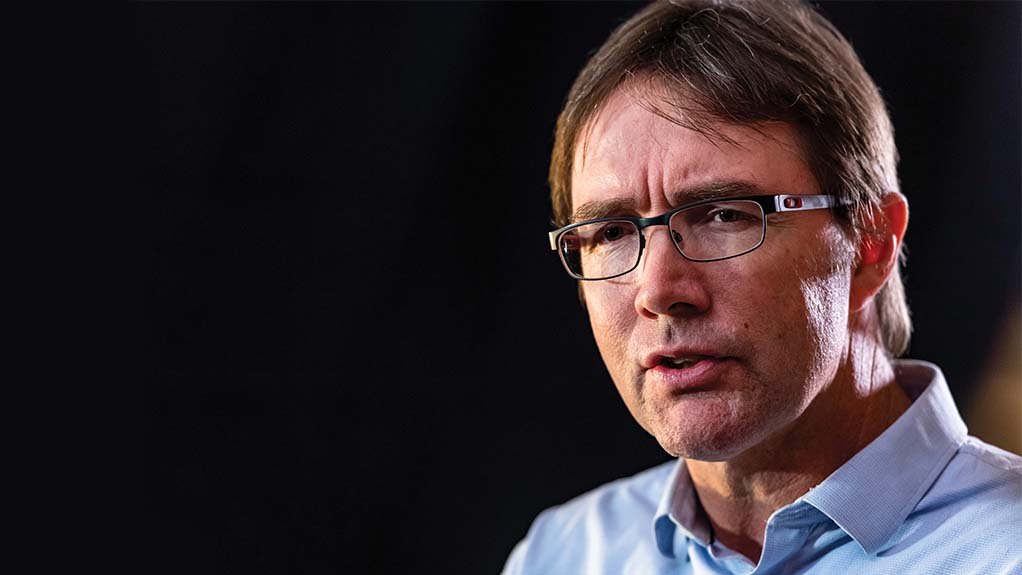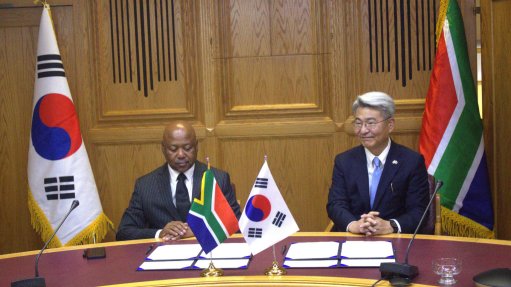South Africa takes 354 days to issue prospecting right, Botswana does it in 40
JOHANNESBURG (miningweekly.com) – Why does it take 354 working days for South Africa’s Department of Mineral Resources and Energy (DMRE) to issue a prospecting right which Botswana accomplishes in 40 days?
Mineral Councils South Africa CEO Roger Baxter put that rhetorical question to the Joburg Indaba under a broad comment of what South Africa can learn from other countries.
“There’s a lot we can learn,” said Baxter.
Botswana’s status is expected to be elevated still higher with the imminent launch of a new multi-authentication portal, whereas a leading bidder on the DMRE tender for the supply of a new cadastre has opted to withdraw from the tender because of being unable to understand the drivers of the DMRE’s terms of reference.
“We’ve got a lot to do to make sure that we are the best in the world,” said Baxter, who recently returned from Australia, where Australia’s coal and iron-ore models were observed first-hand at a time when coal exports from South Africa have been declining disappointingly as a result of rail issues – and Australia’s have been rising despite China banning the importation of coal from Australia.
Notwithstanding the ban, Australia’s coal export performance has gone from 350-million tons to 395-million tons in five years.
“They press the button, they work with government, they invest in the resources, and they get on with the job. Here we sit and talk, and we need to start focusing on doing things that really make a difference in the grand scheme of things,” said Baxter.
Before Covid hit, South Africa was exporting more than 70-million tons of coal; this year it will be lucky to hit the 50-million-ton mark.
“We need to do something different,” Baxter told the Joburg Indaba covered by Mining Weekly.
The capacity of the coal line is 78-million tons and the capacity of the Richards Bay Coal Terminal (RBCT) is 91-million capacity – and RBCT could be escalated to 110-million tons of export capacity at a capital cost of R1-billion and a very short duration of only two months.
The public sector is the custodian of the rail line and the private sector owns RBCT, which highlights the State as once again badly trailing business.
“So, just imagine if we were exporting 110-million tons, basically more than double our export performance. In my view, I think it’s very achievable, but the question we need to ask ourselves here is how are we going to achieve it,” said Baxter.
CHROME, FERROCHROME AND MAPUTO
The slide displayed by Baxter on the exports from South Africa of chrome and ferrochrome again showed the need for South Africa to learn from other countries.
Illustrated were exports through the Port of Maputo in Mozambique being on a sharp rise and the exports through Richards Bay bulk handing facilities in South Africa being in sharp decline.
“I’m not saying Maputo is the nirvana. Maputo is certainly helping,” said Baxter, whereas Richards Bay bulk handing facilities are a major let down.
“We need to try and resolve this particular issue and we’ve been in extensive engagement with Transnet,” Baxter added.
ALL MANGANESE SHOULD BE RAILED
Of the 22-million tons of manganese exported, South Africa is having to transport six-million to seven-million tons by road and railing only 14-million tons to 15-million tons.
“We think it should all be on rail because it is much cheaper by rail. Transnet would get much more benefit, and we’d save a lot more on cost,” said Baxter.
There is also the question of the rail letdown resulting in heavy damages to road infrastructure owing to the mining industry having to resort to the use of road transport to get manganese to port.
“I must tell you, we spend a lot of time engaging with the farming community because they don’t like their roads being messed up in some of these areas.
“On the rail side, there is no doubt in our view that pushing on the same piece of string is not going to get the answer that we want. We need to start looking at what models work around the world and we need to drop them in South Africa,” he said.
One of the models that works around the world is public-private partnership – “not a public-private partnership where the private sector puts in extra capital and Transnet makes the decisions, but a proper public-private partnership model where Transnet, with the industry, in proper partnership, with co-governance and co-determination models, look at what we can do to improve the performance.
“We’ve done a lot together. For example, we met with government to get them to reduce all their procurement rules because it takes 18 months to get critically needed spare parts for the locomotive fleet, and by the way, there are nearly 300 locomotives that are offline at the moment, because of a lack of spare parts.
“How can government policy have such a negative impact on the ability of a State-owned company to be able to buy spare parts they desperately need? One of the issues that was so interesting is to look at the issue of rail. Rail, like power stations, has to be correctly maintained but there was a 100% local-content rule on railway tracks that are not made in South Africa.
“I must say I find that quite unbelievable. What was happening is that a bunch of middlemen were making all the money on having to import the railway track and charging double the prices to Transnet. Now those things are being addressed and we are making progress, and I want to emphasise the point, but we need to see it going a lot faster.
“We need to agree on holistic solutions, not just how you fix one component of the issue. We’re in the business of exporting bulk commodities to the world and rail and ports are a critical component of our business models.
“We are joined at the hip. If they fail, we fail, and that’s what’s happening now. But if we fail, they fail, and by working together, we can really resolve the issue,” said Baxter.
The opportunity cost for all bulk minerals – iron-ore, coal, chrome, ferrochrome and manganese – for 2022, as measured by delivered tonnages versus contracted tonnages, totals R50-billion.
Article Enquiry
Email Article
Save Article
Feedback
To advertise email advertising@creamermedia.co.za or click here
Comments
Press Office
Announcements
What's On
Subscribe to improve your user experience...
Option 1 (equivalent of R125 a month):
Receive a weekly copy of Creamer Media's Engineering News & Mining Weekly magazine
(print copy for those in South Africa and e-magazine for those outside of South Africa)
Receive daily email newsletters
Access to full search results
Access archive of magazine back copies
Access to Projects in Progress
Access to ONE Research Report of your choice in PDF format
Option 2 (equivalent of R375 a month):
All benefits from Option 1
PLUS
Access to Creamer Media's Research Channel Africa for ALL Research Reports, in PDF format, on various industrial and mining sectors
including Electricity; Water; Energy Transition; Hydrogen; Roads, Rail and Ports; Coal; Gold; Platinum; Battery Metals; etc.
Already a subscriber?
Forgotten your password?
Receive weekly copy of Creamer Media's Engineering News & Mining Weekly magazine (print copy for those in South Africa and e-magazine for those outside of South Africa)
➕
Recieve daily email newsletters
➕
Access to full search results
➕
Access archive of magazine back copies
➕
Access to Projects in Progress
➕
Access to ONE Research Report of your choice in PDF format
RESEARCH CHANNEL AFRICA
R4500 (equivalent of R375 a month)
SUBSCRIBEAll benefits from Option 1
➕
Access to Creamer Media's Research Channel Africa for ALL Research Reports on various industrial and mining sectors, in PDF format, including on:
Electricity
➕
Water
➕
Energy Transition
➕
Hydrogen
➕
Roads, Rail and Ports
➕
Coal
➕
Gold
➕
Platinum
➕
Battery Metals
➕
etc.
Receive all benefits from Option 1 or Option 2 delivered to numerous people at your company
➕
Multiple User names and Passwords for simultaneous log-ins
➕
Intranet integration access to all in your organisation




















